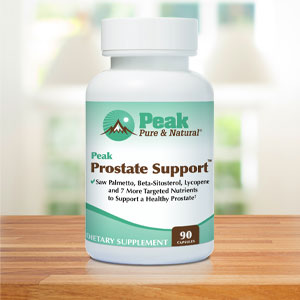Get Easy Health Digest™ in your inbox and don’t miss a thing when you subscribe today. Plus, get the free bonus report, Mother Nature’s Tips, Tricks and Remedies for Cholesterol, Blood Pressure & Blood Sugar as my way of saying welcome to the community!
8 steps to improve your prostate health naturally

Even though the symptoms of an enlarged prostate (aka benign prostatic hyperplasia or BPH) are not life-threatening, they can put a significant cramp in your lifestyle. And who needs that?
Typical BPH symptoms, including a weak urine stream, inability to empty your bladder completely, getting up multiple times a night to urinate, and urinary hesitation, can also place unhealthy stress on your prostate and urinary tract.
And it’s important to know that even if you’ve not been diagnosed with BPH, you can experience the symptoms of an enlarged prostate even though the gland is of normal size.
Fortunately, the following suggestions on how to shrink the prostate can help put an end to your sleepless nights, improve and support your prostate health and help prevent possible future prostate health issues.
Choose foods that can reduce inflammation and help with better prostate health
For better prostate health you want to choose foods that can reduce inflammation or at least not promote it. These foods are largely found in the Mediterranean diet, which includes oily fish (rich in anti-inflammatory omega-3 fatty acids), lots of fruits and vegetables, whole grains (stick to gluten-free if possible), and foods that provide healthy fats such as avocados, olives, nuts, and seeds.
Avoid foods that can irritate and harm the prostate
Certain types of foods are unfriendly not only for your prostate but overall health as well. For example, spicy foods can worsen symptoms of prostatitis, while processed foods, artificial sweeteners, sugary foods, dairy products, red meat, and fried foods can promote inflammation.
Alcohol also is best to avoid, but if you must, no more than two drinks daily. Caffeinated beverages such as coffee, tea, and some energy drinks also can exacerbate urinary tract symptoms.
Plant protein is a better choice than animal protein
To protect your prostate, get the majority of your protein from plants rather than animals. Animal protein typically comes from red meat and dairy products. (Fish, with its inflammation-fighting omega-3 fatty acids, is an exception.)
Both red meat and dairy foods are associated with inflammation. In addition, consumption of red meat is associated with an increased risk of prostate cancer, while dairy foods were recently shown to significantly increase the risk of dying among men who had been diagnosed with prostate cancer. Plant protein sources include beans, amaranth and quinoa, seeds (e.g., chia, hemp, pumpkin), lentils, and fermented soy.
A healthy weight will reduce your enlarged prostate symptoms
Carrying excess weight is associated with an increased risk of having an enlarged prostate. A review article in the Journal of Urology, for example, noted that “most studies revealed that obesity increases the risk of clinical benign prostatic hyperplasia” and that “obesity increases the risk of lower urinary tract symptoms.” In addition, a recent review in Current Opinions in Urology reported that being obese also reduces the effectiveness of drugs used to treat an enlarged prostate (5-alpha reductase inhibitors).
Losing weight is not always easy, but it beats medicines with unpleasant side effects.
Exercise leads to better prostate health and less sleepless nights
Engaging in regular physical exercise can have a significant impact on both your risk of developing an enlarged prostate and managing its symptoms. In fact, a review of the research published in the Journal of Urology concluded that “most studies showed that physical activity significantly decreased the risk of benign prostatic hyperplasia.”
To reap the best prostate health benefits from exercise, be sure to participate in both aerobic and resistance activities and vary your sessions during the week.
Certain natural supplements can support a healthy prostate
A number of natural prostate supplements can benefit an aging prostate, but be sure to choose high-quality products that contain ingredients shown to be effective in managing natural inflammation of the prostate.
One such ingredient is saw palmetto, which has been shown to be effective in a number of studies. One of the most recent examples involved a 10-year study of 38 men with early BPH, in which a dose of 320 mg once daily for a decade stopped progression of the disease.
Other natural supplements found to help with an aging prostate include curcumin, stinging nettle, zinc, and pollen extract. Ideally, you use a high-quality prostate supplement that combines several natural ingredients to help manage inflammation and support prostate optimal health.
Managing and balancing hormone levels is one of the best ways to restore prostate health
Because hormone production changes as you age, it is important to maintain a healthy balance in an effort to support prostate health and, therefore, help ward off conditions such as an enlarged prostate. One hormone level that declines with age is testosterone, and can occur when the enzyme 5-alpha-reductase transforms testosterone into dihydrotestosterone (DHT).
The result is a drop in T levels and an imbalance in the ratio of T to estrogen, leading to an enlarged prostate. Fortunately, you can help restore balance to your hormone levels by exercising regularly, dropping excess pounds, maintaining a healthy body weight, and using natural supplements that promote prostate health and healthful testosterone levels. Using a natural supplement for testosterone health can also help.
Reducing stress can also reduce your prostate size
The body deals with stress by raising levels of certain hormones, including adrenaline and cortisol. Unfortunately, when stress is chronic, cortisol levels remain high, which in turn elevates inflammation. Stress also can worsen urinary tract symptoms associated with BPH, such as urinary urgency, painful urination, dribbling, and urinary frequency.
You can take back control of your life and stress levels by incorporating stress-reduction practices into your life. Yoga, deep breathing, tai chi, meditation, guided visualization, and exercise all can be effective at alleviating stress.
Getting eight hours of sleep every night can bring down stress levels, as can following a healthful diet. If you find the stress in your life is more than you can handle alone, you might consult a therapist or try group therapy.
If you are living with an aging and unhealthy prostate, consider incorporating the 8 steps to better prostate health into your lifestyle – and get back to enjoying life!
Editor’s note: Did you know that when you take your body from acid to alkaline you can boost your energy, lose weight, soothe digestion, avoid illness and achieve wellness? Click here to discover The Alkaline Secret to Ultimate Vitality and revive your life today!














